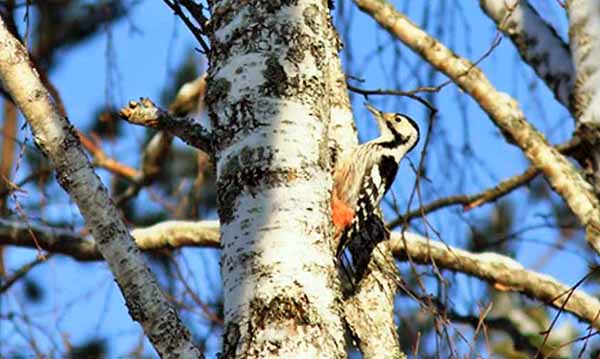White-Backed Woodpecker Can Thrive in Commercial Forests
UPM, Helsinki, Finland, WWF Finland, Finnish Environment Institute, and Metsähallitus Parks & Wildlife Finland have carried through a joint project to promote the living conditions of the endangered white-backed woodpecker in commercial forests. During the past 20 years, the population of the white-backed woodpecker has multiplied thanks to the conservation and management activities of its natural habitat. Today there are more than 200 pairs of white-backed woodpeckers nesting in Finnish forests.
"This project has offered us plenty of new information regarding the living conditions of the white-backed woodpecker," said Sami Oksa, manager, Sustainable Forestry, UPM. "Even a small forest area with broad-leaved trees can offer a great deal for the woodpeckers. They find enough food in single broad-leaved trees and build nests in the trees that are left in a regeneration felling area. Therefore, leaving enough broad-leaved trees and dead wood in commercial forests ensures good living conditions for the white-backed woodpecker," Oksa noted.
"Our conservation measures over the past 20 years have been very successful," said Markku Mikkola-roos from the Finnish Environment Institute. "Doubling the amount of nesting pairs will happen in the commercial forests," he continues.
Metsähallitus is responsible for monitoring the white-backed woodpecker and promoting its conservation. Senior Conservation Biologist pekka heikkilä confirms that, thanks to recent efforts, the white-backed woodpecker has been removed from the list of critically endangered species. "I'm very happy to see that the woodpecker population is growing continuously. Good forestry methods, such as leaving broad-leaved trees among coniferous trees, have also had a remarkable effect on the size of the population," Heikkilä emphasized.

WWF Finland, an active partner in the project, sees the positive impacts on a wider scale. "The efforts to improve the habitat of the white-backed woodpecker are also helping other endangered species," said Annukka Valkeapää, forest expert from WWF Finland. "Increasing the number of broad-leaved trees and the amount of dead wood in commercial forests is important for several species. So, even if the white-backed woodpeckers do not immediately find their way into the forest, the effort has not gone to waste," Valkeapää reassured.
The project partners have created a guide to help forest owners and forestry professionals support the conservation of the white-backed woodpecker. The White-Backed Woodpecker and Forestry Guide in Finnish can be downloaded on the web sites of all partners.
TAPPI
http://www.tappi.org/

